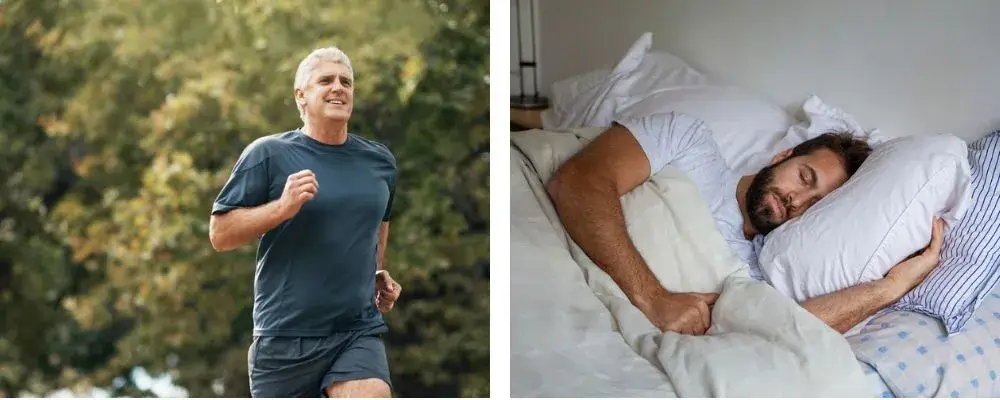Table of Contents
- What Happens When You Stop Taking Sermorelin?
- What Is Sermorelin?
- Sermorelin Benefits
- Why Would You Stop Taking Sermorelin?
- What Happens in the Body When You Stop Taking Sermorelin?
- How to Safely Stop Sermorelin
- How Long Do I Need to Be On Sermorelin Therapy?
- Do You Experience Withdrawal If You Stop Taking Sermorelin?
What Happens When You Stop Taking Sermorelin?
Sermorelin can be very effective in treating adults with growth hormone decline. However, sermorelin therapy is not intended to be taken indefinitely.
Sermorelin Acetate, more commonly known simply as “sermorelin,” is commonly prescribed as a treatment for adult-onset growth hormone deficiency (GHD) and age-related decline in human growth hormone (HGH) levels.
It is often used by individuals looking to increase their growth hormone levels safely and naturally as they age, and for many, it is a lower-cost alternative to traditional growth hormone injections. But what happens when you stop taking Sermorelin? Let’s explore what sermorelin is, its benefits, how it can be used to increase growth hormone levels naturally, and most importantly, what happens when you stop taking it and how to do so safely.
What Is Sermorelin?
Sermorelin Acetate is a synthetic peptide made up of 29 amino acids that stimulate the production and release of growth hormone (GH) by the pituitary gland. It acts as a growth hormone-releasing hormone (GHRH) analog, mimicking the effects of the naturally occurring GHRH that signals the pituitary to produce more GH. Sermorelin is not a growth hormone itself but rather a stimulator of your body’s own human growth hormone (HGH) production, making it a more natural and physiologically sound option compared to synthetic HGH injections.
It is prescribed primarily for adults who experience age-related declines in GH production. Declining HGH levels can lead to symptoms such as reduced muscle mass, loss of muscle tone, increased fat accumulation, decreased energy, poor sleep, and slower recovery from exercise or injury.
How Does Sermorelin Treat Growth Hormone Deficiency?
Sermorelin is given as a subcutaneous injection. It can be quite effective in treating growth hormone deficiency by promoting the body’s natural production of HGH. As we age, the pituitary gland, which produces growth hormone, becomes less active. Sermorelin works by binding to receptors in the pituitary gland, triggering the release of growth hormone. Once released, GH interacts with various tissues and organs in the body, helping to regulate metabolism, muscle growth, fat breakdown, and overall cellular health.
Because Sermorelin stimulates your body to produce its own growth hormone, it works with the natural rhythms of HGH release, particularly during sleep, when GH production is at its peak. This makes sermorelin an effective and often safer alternative to direct HGH injections.
Sermorelin Benefits
Sermorelin therapy offers numerous benefits, particularly for adults experiencing GHD or age-related GH decline. Some of the potential benefits include:
- Increased muscle mass
- Reduced body fat
- Improved energy levels
- Better sleep quality
- Reduction of wrinkles and improved skin elasticity
- Decreased belly fat and improved lean muscle mass
- Enhanced skin health
- Reduced blood pressure
- Improved cognitive function
- Improved bone density
- Faster recovery from disease and injury
- Overall improved quality of life

Why Would You Stop Taking Sermorelin?
There are several reasons why someone might stop taking sermorelin. A common reason is that you may be experiencing side effects or other adverse reactions. Some of the most common side effects of sermorelin include:
- Joint pain
- Headache
- Injection site reactions
- Swelling
- Dizziness or lightheadedness
If any of these common side effects or other adverse reactions are your reason for stopping, speak to your healthcare provider; often, any adverse effects of Sermorelin can be reduced or eliminated by adjusting your dosage.
Some individuals may feel they’ve achieved their desired results and no longer need the therapy. In some cases, your healthcare provider may determine that your HGH levels have stabilized and no longer require treatment. Lastly, there may be some other medical reason for discontinuation besides adverse effects.
What Happens in the Body When You Stop Taking Sermorelin?
When you stop taking sermorelin, your body will gradually revert to its natural growth hormone production levels, which may be lower than when you were on treatment. The exact changes you experience depend on several factors, including age, baseline growth hormone levels, and how long you’ve been on sermorelin therapy.
In some cases, the body’s ability to produce HGH will start to decline again over time, leading to a gradual return of your initial symptoms of GHD that prompted your prescription of sermorelin in the first place. You may notice reduced energy, increased body fat, slower recovery times, and decreased muscle mass as your HGH levels return to their pre-treatment state. However, stopping Sermorelin doesn’t lead to an immediate or sharp drop in HGH levels, and it does not mean that your symptoms will necessarily return, especially if you follow the suggestions in the section below: How Can I Maintain My Results After Stopping Sermorelin?
How to Safely Stop Sermorelin
To ensure you stop safely, it’s essential to work with your healthcare provider and follow a medical professional’s advice when discontinuing Sermorelin therapy. Stopping abruptly may lead to a more noticeable drop in HGH levels, which could cause discomfort or a return of symptoms. Your doctor may recommend gradually tapering your dosage over time, allowing your body to naturally adjust to lower growth hormone production levels.
How Long Do I Need to Be On Sermorelin Therapy?
The time you need to be on sermorelin therapy depends on your individual goals and medical needs. Some individuals may benefit from long-term therapy, especially if they are older or have significantly reduced growth hormone production. Others may only need a few months of therapy to address specific issues like muscle loss or poor sleep quality. It’s essential to work closely with your healthcare provider to determine the optimal duration for your treatment.
Do You Experience Withdrawal If You Stop Taking Sermorelin?
Unlike some medications that cause withdrawal symptoms when stopped, sermorelin doesn’t lead to withdrawal in the traditional sense. However, as HGH levels decline after stopping treatment, you may experience a gradual return of symptoms such as fatigue, weight gain, or decreased muscle mass. This isn’t a withdrawal effect but rather the body returning to its pre-treatment state.
Will Growth Hormone Deficiency Symptoms Return If I Stop Taking Sermorelin?
Symptoms could return once you stop taking sermorelin. Sermorelin is a treatment for growth hormone deficiency, not a cure. Once you stop, your HGH production will likely decrease over time, which could lead to a return of the symptoms you were trying to manage, such as low energy, increased body fat, or poor sleep. The severity of these symptoms will depend on your age, baseline HGH levels, and how long you were on sermorelin therapy. However, you can help mitigate the return of GHD symptoms once you stop taking sermorelin if you follow the lifestyle tips in the next section.

How Can I Maintain My Results After Stopping Sermorelin
Once your healthcare provider feels you have completed your therapy and it is time to stop taking sermorelin, there are many things you can and should do to help maintain your quality of life and positive results. Here are ten ways to maintain your results after completing a program of sermorelin therapy.
1. Continue Regular Exercise
- Strength Training: Continue with strength training exercises at least 2-3 times weekly to maintain muscle mass and improve metabolism.
- Cardiovascular Exercise: Incorporate aerobic exercises like walking, running, cycling, or swimming to support cardiovascular health and maintain energy levels.
- High-Intensity Interval Training (HIIT): HIIT can be particularly effective in maintaining fat loss and boosting metabolism post-therapy.
2. Maintain a Balanced Diet
- High-Protein Intake: Consuming enough protein (lean meats, fish, eggs, legumes) is essential for maintaining muscle mass and supporting recovery.
- Healthy Fats: Include healthy fats like avocados, nuts, seeds, and olive oil to help regulate hormones and support overall health.
- Complex Carbohydrates: Opt for complex carbs like whole grains, vegetables, and fruits to provide sustained energy and prevent fat gain.
- Caloric Management: Monitor caloric intake to ensure you are eating enough to support your activity levels without leading to weight gain.
3. Get Sufficient Sleep
- Growth hormone production peaks during deep sleep, so it is crucial to maintain good sleep hygiene.
- Aim for 7-9 hours of quality sleep per night, ensuring a regular sleep schedule to help regulate hormone levels and recovery.
4. Manage Stress Effectively
- Stress Reduction Techniques: Practice mindfulness, meditation, yoga, or deep breathing exercises to reduce cortisol levels, which can negatively impact weight, muscle mass, and energy.
- Avoid Chronic Stress: Prolonged stress can counteract the positive effects of GHRT by increasing fat storage and reducing muscle mass.
5. Stay Hydrated
- Adequate hydration supports metabolic processes, muscle function, and overall energy levels.
- Aim to drink 8-10 glasses of water daily, more if you are physically active.
6. Consider Maintenance Supplements
- Amino Acids: Certain amino acids, like L-arginine or L-glutamine, may help support natural growth hormone production and muscle recovery.
- Vitamins & Minerals: Ensure you get sufficient vitamin D, magnesium, and zinc, which are important for muscle health, energy production, and hormonal balance.
- Creatine: This supplement can help maintain muscle mass and strength gains achieved during GHRT.
7. Follow Up with Your Healthcare Provider
- Regular check-ups with your doctor can help monitor hormone levels, metabolic health, and overall well-being.
- Discuss any changes in health or concerns about the return of previous symptoms.
8. Maintain a Healthy Body Composition
- Keep track of your body composition (muscle vs. fat) rather than focusing solely on weight. Building or maintaining muscle mass is key to stabilizing your metabolism and preventing fat gain.
- Using body fat percentage tracking methods can provide a better picture of your health than scale weight alone.
9. Limit Alcohol and Avoid Smoking
- Alcohol and smoking can negatively impact hormonal balance, muscle recovery, and energy levels.
- Limit alcohol intake and avoid smoking to preserve the benefits gained from GHRT.
10. Stay Active in Daily Life
- Avoid being sedentary. Incorporate physical activities into daily routines, such as walking, cycling, or standing at work, to stay active and burn more calories throughout the day.
How to Avoid Negative Effects When Stopping Sermorelin
The best way to avoid negative effects when stopping sermorelin is to work closely with your healthcare provider. They can guide you in tapering off the medication gradually, ensuring that your body adjusts smoothly. Additionally, maintaining healthy habits like regular exercise, a balanced diet, and stress management can help support your body’s natural GH production and minimize the return of symptoms.
In conclusion, stopping Sermorelin therapy can lead to a gradual return of the symptoms associated with growth hormone deficiency. However, by tapering off the medication under the guidance of your healthcare provider and maintaining a healthy lifestyle, you can minimize the negative effects and support your body’s natural GH production. Always consult with your doctor before making any changes to your treatment plan.
How to Find the Best Sermorelin Therapy Near Me
Now that you know much more about the benefits of sermorelin therapy and what happens when you stop, you may want to know how to find the best provider of sermorelin therapy in your area. Look no further than Medzone Clinic. At Medzone, our healthcare providers have years of experience in treating age-related hormone decline in men and women. We are particular experts in how to use novel therapies like sermorelin to treat age-related GHD in adults. And because we serve the hormone replacement needs of men and women across the country, we are bound to have a clinic near you. Get started by contacting us today!

No Comments
Sorry, the comment form is closed at this time.